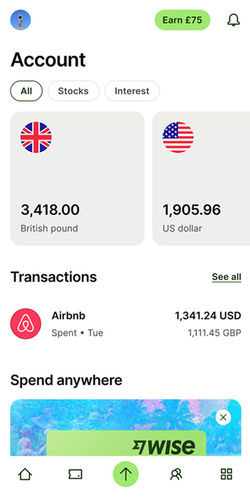Find the best ways to transfer money to Ireland
Compare money transfer deals for sending EUR.
Find the best, cheapest, and easiest ways to send money to Ireland at the best EUR exchange rates.
Read on for the best deals, expert information, and all you need to transfer money to Ireland.
Send money to Ireland
"Over 16 million customers use Wise, mostly for their excellent mobile app, transparent fee structure & use of mid-market rates. Now increasingly used for larger transfers."
"Over 16 million customers use Wise, mostly for their excellent mobile app, transparent fee structure & use of mid-market rates. Now increasingly used for larger transfers."
"Over 16 million customers use Wise, mostly for their excellent mobile app, transparent fee structure & use of mid-market rates. Now increasingly used for larger transfers."
"Xe has over 30 years of currency exchange experience, and is one of the most reputable names on the market. 200 countries, 100 currencies, & funds often received in seconds."
"Xe has over 30 years of currency exchange experience, and is one of the most reputable names on the market. 200 countries, 100 currencies, & funds often received in seconds."
"Xe has over 30 years of currency exchange experience, and is one of the most reputable names on the market. 200 countries, 100 currencies, & funds often received in seconds."
"Over 16 million customers use Wise, mostly for their excellent mobile app, transparent fee structure & use of mid-market rates. Now increasingly used for larger transfers."
"Over 16 million customers use Wise, mostly for their excellent mobile app, transparent fee structure & use of mid-market rates. Now increasingly used for larger transfers."
"Over 16 million customers use Wise, mostly for their excellent mobile app, transparent fee structure & use of mid-market rates. Now increasingly used for larger transfers."
"Currencies Direct have over 30 years of global money transfer expertise. Award winning service with a TrustPilot rating of 4.9. Lock-in rates for the future or trade 24/7 on web or mobile."
"Currencies Direct have over 30 years of global money transfer expertise. Award winning service with a TrustPilot rating of 4.9. Lock-in rates for the future or trade 24/7 on web or mobile."
"Currencies Direct have over 30 years of global money transfer expertise. Award winning service with a TrustPilot rating of 4.9. Lock-in rates for the future or trade 24/7 on web or mobile."
"Revolut has 50+ million customers globally. You can hold up to 36 currencies in the app and send money quickly in 70+ currencies to 160+ countries."
"Revolut has 50+ million customers globally. You can hold up to 36 currencies in the app and send money quickly in 70+ currencies to 160+ countries."
"Revolut has 50+ million customers globally. You can hold up to 36 currencies in the app and send money quickly in 70+ currencies to 160+ countries."
"Key Currency offers a personal service with a dedicated account manager. There are no transfer limits or fees which is perfect for larger send amounts."
"Key Currency offers a personal service with a dedicated account manager. There are no transfer limits or fees which is perfect for larger send amounts."
"Key Currency offers a personal service with a dedicated account manager. There are no transfer limits or fees which is perfect for larger send amounts."
"Xe has over 30 years of currency exchange experience, and is one of the most reputable names on the market. 200 countries, 100 currencies, & funds often received in seconds."
"Xe has over 30 years of currency exchange experience, and is one of the most reputable names on the market. 200 countries, 100 currencies, & funds often received in seconds."
"Xe has over 30 years of currency exchange experience, and is one of the most reputable names on the market. 200 countries, 100 currencies, & funds often received in seconds."
"OFX have been helping individuals and businesses send money for over 25 years. Transfer in 50+ currencies to 170+ countries, with 24/7 phone access to currency experts."
"OFX have been helping individuals and businesses send money for over 25 years. Transfer in 50+ currencies to 170+ countries, with 24/7 phone access to currency experts."
"OFX have been helping individuals and businesses send money for over 25 years. Transfer in 50+ currencies to 170+ countries, with 24/7 phone access to currency experts."
"Regency's UK-based account management team has vast experience. Get support on all kinds of transfers, from overseas property transactions to business payments & more."
"Regency's UK-based account management team has vast experience. Get support on all kinds of transfers, from overseas property transactions to business payments & more."
"Regency's UK-based account management team has vast experience. Get support on all kinds of transfers, from overseas property transactions to business payments & more."
"Currencyflow is a new FX broker with a focus on transparent, fair rates and accessible customer service. Contact the UK-based team for a free quote."
"Currencyflow is a new FX broker with a focus on transparent, fair rates and accessible customer service. Contact the UK-based team for a free quote."
"Currencyflow is a new FX broker with a focus on transparent, fair rates and accessible customer service. Contact the UK-based team for a free quote."
"Lumon has cared for over 69,000 customers since 2000. Get support for larger transfers from dedicated currency specialists."
"Lumon has cared for over 69,000 customers since 2000. Get support for larger transfers from dedicated currency specialists."
"Lumon has cared for over 69,000 customers since 2000. Get support for larger transfers from dedicated currency specialists."
"Xoom, a PayPal service, allows you to send money in more than 160 countries. You can send cash for over-the-counter pickup or home delivery, as well as send by bank transfer or debit card."
"Xoom, a PayPal service, allows you to send money in more than 160 countries. You can send cash for over-the-counter pickup or home delivery, as well as send by bank transfer or debit card."
"Xoom, a PayPal service, allows you to send money in more than 160 countries. You can send cash for over-the-counter pickup or home delivery, as well as send by bank transfer or debit card."
"Securely send money to and from 150+ countries and 20+ currencies. Same-day transfers avaialble on most major currencies."
"Securely send money to and from 150+ countries and 20+ currencies. Same-day transfers avaialble on most major currencies."
"Securely send money to and from 150+ countries and 20+ currencies. Same-day transfers avaialble on most major currencies."
"Fast, secure internatinal transfers with no fees and transparent rates. They offer a free currency card for use at home and abroad."
"Fast, secure internatinal transfers with no fees and transparent rates. They offer a free currency card for use at home and abroad."
"Fast, secure internatinal transfers with no fees and transparent rates. They offer a free currency card for use at home and abroad."
"Paysend has transparent fees and rates, with transfer sent within seconds to your recipient's bank. They also have global 24/7 support for any enquiries, and bank-level security."
"Paysend has transparent fees and rates, with transfer sent within seconds to your recipient's bank. They also have global 24/7 support for any enquiries, and bank-level security."
"Paysend has transparent fees and rates, with transfer sent within seconds to your recipient's bank. They also have global 24/7 support for any enquiries, and bank-level security."
"Moneycorp is an established player in the market, with a focus on private clients and corporates. Make overseas payments in over 120 currencies and 190 countries."
"Moneycorp is an established player in the market, with a focus on private clients and corporates. Make overseas payments in over 120 currencies and 190 countries."
"Moneycorp is an established player in the market, with a focus on private clients and corporates. Make overseas payments in over 120 currencies and 190 countries."
"Moneygram is a well established service with over 80 years in the sector. They support over 200 countries worldwide and have over 440,000 retail locations."
"Moneygram is a well established service with over 80 years in the sector. They support over 200 countries worldwide and have over 440,000 retail locations."
"Moneygram is a well established service with over 80 years in the sector. They support over 200 countries worldwide and have over 440,000 retail locations."
How to get the best rate when sending money to Ireland
Always compare rates
Don't pay more than you have to. Use our live comparison tool to make sure you aren't missing the best rates on EUR transfers.
Choose a provider
Select the provider that offers you the most EUR and fits your transfer needs.
Click, sign up & send
Follow the steps & make your transfer. Your transfer to Ireland will soon be on its way.
Overall best choice: Wise
We tested & reviewed 15 companies offering transfers to Ireland, and Wise scored the highest.
Wise offers the best combination of transfer fees, rates, speed, and has the best overall experience for transfers to Ireland.
At the moment, if you were to send $7,000 to EUR, it would cost you $27.22 in fees, and your recipient will get 5,878.74 EUR.

The cheapest way to send money to Ireland: Key Currency
From the 15 companies tested, Key Currency consistently offers the cheapest money transfer EUR to Ireland.
Key Currency charges $0 per transfer to Ireland and applies a 0.25% markup on the EUR exchange rate.
For the best value, use a bank transfer deposit to maximize the amount of EUR received.

Fastest way to send money to Ireland: Wise
Our data shows that Wise is the fastest way to transfer EUR right now.
With Wise, the transfer time to Ireland is same day (for a $7,000 transfer).
Wise charges $27.22 in fees on $7,000 transfer and adds a 0% markup.
The ‘fastest’ way to transfer money to Ireland includes the transfer amount, deposit method, and transfer and withdrawal times.

The easiest way to send money to Ireland: Wise
They’re highly transparent with fees, charging $27.22 per transfer with a 0% markup on the EUR mid-market rate.
With multiple deposit and withdrawal options and reliable customer service, getting started with Wise takes less than 10 minutes, making it a fast, cheap, and user-friendly option.

Everything you need to know when sending money to Ireland
Don’t just settle for the most popular option—always compare.
Most transfers/payments to Ireland include fees and add a markup on the ‘real’ EUR exchange rate.
The total cost of your transfer to Ireland can vary based on your deposit and delivery methods, the amount of EUR transferred, and where you're located.
Our comparison covers 15 money transfer services that support Euro transfers, helping you find the best fit for your needs.
Sending large amounts of EUR to Ireland
Wise consistently ranked as the top choice for large EUR transfers. They charge $27.22 per transfer to Ireland and apply only a 0% markup on the EUR exchange rate.
Whether you’re purchasing property, paying tuition fees in EUR, planning a wedding in Ireland, or making business payments, Wise ensures a smooth and secure process.
When sending large amounts of Euro to Ireland, consider factors like transfer limits, markup on the EUR rate, customer service, and any legal, tax, or government-imposed restrictions in Ireland.

Understanding the costs involved when moving money to Ireland
When calculating the cost of money transfers to Ireland, here's what really matters: the country of origin, amount, payment method, fees, and the markup on the EUR exchange rate.
Exchange rate markup
This is a percentage added on top of the "real" EUR rate (known as the mid-market rate).
Wise, for example, offers the best exchange rate. It adds 0% markup to the USD-EUR exchange rate (0.8435 EUR - 0% per US Dollar).
Transfer fees
These are fixed and/or percentage fees added for the service when sending money to Ireland.
Let's imagine you want to send $7,000 from the US to Ireland.
After analyzing 15 companies supporting Euro, we found Key Currency to offer the lowest fees ( $0 in fees and 0.25% markup).
However, exact fees vary by deposit method and the service, for example:
Bank transfers vary from $0 to $490.00000000000006
Debit cards range from $0 to $0
Credit card fees vary a lot, mainly due to cash advance fees and/or additional fees from your credit card provider.

Getting the best EUR rate when sending money to Euro
The exchange rate is the value of the Euro (EUR) compared to other currencies. Since it consistently moves up and down, sending at the high will give your receiver more EUR compared to the low.
In the past 7 days, the EUR exchange rate reached:
An average rate of 0.843 Euro per US Dollar
A high of 0.8462 EUR per USD
And a low of 0.8387 EUR per US Dollar
The EUR/USD exchange rate has seen some movements. Making a transfer when the rate is close to 0.8462 EUR/USD will result in more EUR received.
Wise is our top recommendation for sending Euro, offering a markup of 0% which is 0% better than the next cheapest option.
Get notified when it’s the best time to transfer Euros
Sign up for our rate alerts, and we’ll notify you when it’s the best time to send EUR!
Payment methods available for money transfers to Ireland
How you fund your money transfer to Ireland directly affects the speed, cost, and the amount of EUR your recipient will receive. Here are the most common options for funding your transfer to Ireland:
Bank transfers
Bank deposits are reliable and common for international EUR transfers, available through most services.
While they tend to be cheaper, it may take up to 2-3 business days for the funds to arrive.
You also may have an option to use the SWIFT network for a bank deposit to Ireland, avoid it where possible. SWIFT deposits are slow and expensive, instead check if there are cheaper options.
Based on our recent testing of 15 providers accepting Ireland transfers, we found Key Currency to be the cheapest option, charging $0 per transfer with a 0.25% markup.

Debit and prepaid cards
Debit card transfers to Ireland are generally faster than bank transfers. Most EUR transactions will be completed within a few hours. However, this convenience usually comes with increased fees.
We recommend Paysend for debit and prepaid card deposits when sending money to Ireland. Paysend charges a 1.22% markup on the EUR rate and $0 in transfer fees.

Credit cards
A credit card deposit is another option for sending EUR to Ireland.
Typically it is more expensive, and your CC company may charge you cash advance fees, and apply increased interest rates.
If you want to fund your transfer to Ireland with a credit card, we to get the best deal.

How we analyze the market
We track the cost, speed, and product offerings of the leading money transfer services available in Ireland.
Our comparison engine and algorithms evaluate providers based on over 25 factors, including transfer fees, ease of use, exchange rates, mobile apps, transfer times & customer support.
We also consider how these services are rated on platforms like TrustPilot, AppStore, and Google Play, giving you a comprehensive view of what to expect.
This thorough analysis helps you get the best available deal - every time you want to move money to Ireland.
We also provide unbiased and detailed reviews of all the top money transfer companies. You can use these reviews to find the best service for your needs when sending money to Ireland
For a deeper understanding of our commitment to integrity and transparency, we invite you to read our editorial policy and review methodology.

Related transfer routes
Send money from Ireland
Send money to Ireland
FAQs
Find answers to the most common questions on our dedicated FAQ page.
How much money can I transfer to Ireland, and are there any limits?
Are there tax implications when sending funds to Ireland?
What are the typical fees and exchange rates for sending EUR?
How long will it take for my money to reach Ireland?
Can I schedule regular EUR transfers?
What currency is used in Ireland?
Can I send EUR from any country?
How can I track my money transfer to Ireland, and what should I do if something goes wrong?
Is it better to use my bank for EUR transfers?
Can I use MoneyTransfers.com to money transfers?
Tools & resources
Contributors







.svg)














